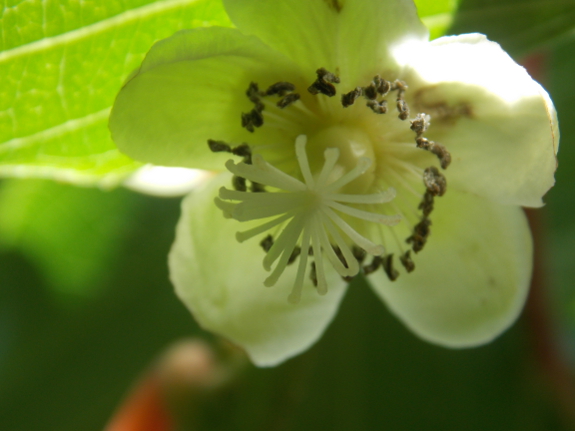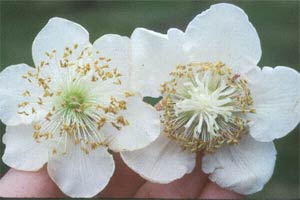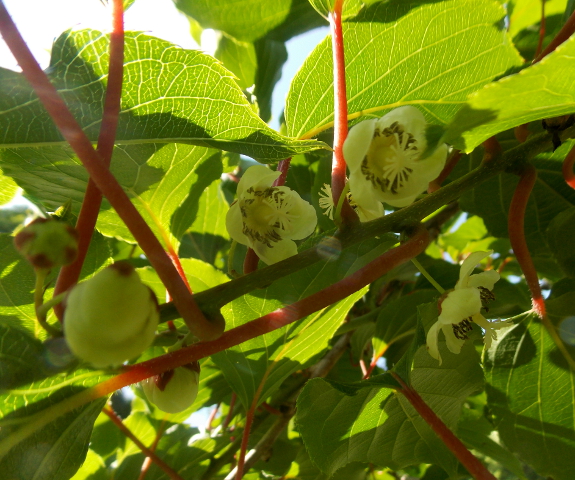
Do you need a male hardy kiwi to produce fruit?

Let me start with the official information found in many books and websites. Hardy kiwis
come in male and female varieties, and the recommendation is to include
one male plant for every eight females in your orchard. Only a
few varieties --- such as Issai --- are listed as having both male and
female flowers on the same plant, meaning you can get fruit from a
single vine.
Our Anna (aka Ananasnaya)
vine is flowering for the first time this spring, and when I looked up
into the pretty white bells, I noticed that each bloom consists of a
central ovary (the green bump, which will turn into a fruit) surrounded
by quite a few stamens. Wait a minute! The presence of
stamens means that the flower is both male and female and is potentially
self-pollinating. I even tapped the stamens with my finger and
saw pale pollen come off, a sign that the male parts are functional.
 Is my Anna kiwi just an odd duck? I don't think so, based on the photo to the left, from the Washington State University Extension Service.
The WSU photo shows a male kiwi flower on the left and a female on the
right --- their "female" flower, just like mine, is full of stamens.
Is my Anna kiwi just an odd duck? I don't think so, based on the photo to the left, from the Washington State University Extension Service.
The WSU photo shows a male kiwi flower on the left and a female on the
right --- their "female" flower, just like mine, is full of stamens.
Interestingly, one
of our readers commented last year to say that she had planted an Anna
kiwi and a male kiwi, but the male never blooms with the female...and
yet she still gets fruits. We're accidentally running a
similar experiment since our Anna kiwi is the most vigorous of the three
vines I planted in 2008 and our male isn't blooming this year. If
we get fruits just like the commenter did even though no male flowers
are available, I'll know that either Anna is like Issai and is both male
and female, or that perhaps all "female" hardy kiwis are male too and
don't need a pollinator plant.

I'd love to hear from
readers who have hardy kiwis flowering right now. If you go out
and look at the flowers of your female plants, do you see a ring of
stamens? If so, what variety are you growing? Could the need
for male hardy kiwis just be an untested "fact" that's been passed down
from book to book for years with no data to back it up?
Want more in-depth information? Browse through our books.
Or explore more posts by date or by subject.
About us: Anna Hess and Mark Hamilton spent over a decade living self-sufficiently in the mountains of Virginia before moving north to start over from scratch in the foothills of Ohio. They've experimented with permaculture, no-till gardening, trailersteading, home-based microbusinesses and much more, writing about their adventures in both blogs and books.
Want to be notified when new comments are posted on this page? Click on the RSS button after you add a comment to subscribe to the comment feed, or simply check the box beside "email replies to me" while writing your comment.

I had an anna cultivar as a kid it was sold to me as a plant that was both male and female but had better yield if cross polinated with a pure male plant.
Here is a photo of pure female kiwi flowers
http://www.cornhillnursery.com/retail/fruit/kiwiflowers.html
Many plants have both male and female flowers/parts, but still can't fertilize themselves; the pollen must come from a different plant (and often an entirely different variety). See http://en.wikipedia.org/wiki/Allogamy
This is not to be confused with being mono/dioecious, which just talks about the location of the male/female parts (mono = males on one plant, females on another plant; dio = both parts on the same plant).
It has more to do with a degree of Self-incompatibility than anything, I think. Without a male you might still get fruit but set and size of those that do mature have always been disapointing, for me. I have an Issa, and a redish fruited one and even with issa "not" needing a male, when my male, or red female flowers at the same time(rarely:( the difference is huge. I'm sure there has to be different male Varieties out there to match up with the flowering of the females. Some searching is in oder I would say.
Hi Anna, When I saw your post I ran out to look at my kiwis. I have two vigorous females that were flowering and one male who wasn't doing so well (no flowering). I was excited seeing a small budding "fruit" (see image on blog), but in a week they just fell off. I'm thinking the plant jettisoned them because they weren't fruits at all, due to lack of pollination. I've given my male kiwi pride of place in a nice sunny spot so hope to see a difference next year.
Anna:
Sorry your plants were frosted, it's a long wait for these plants to produce.
Yes, both plants were producing fruit, I had tons of blooms. They both dropped though. I trimmed some back today to keep them on the other side of the railing, they grow so fast. When I cut a branch from the one I thought was a male I noticed it had about 10 pieces of fruit almost fully grown. Ugh!
Maybe these are the only ones that had successfully been pollinated by an insect? I don't know. I definitely know they both had fruit so it must have been pollinated by another local plant? BTW they were the furthest shoot from the other plant. I still have the original tag and they are Anna plants.
Thanks!